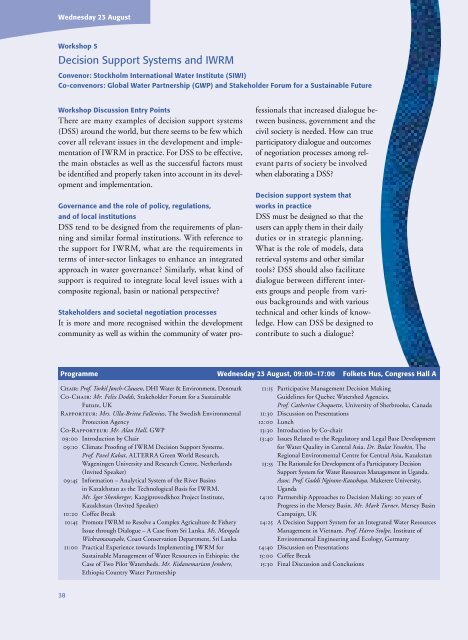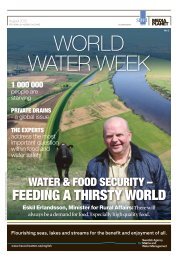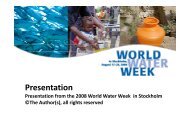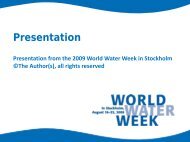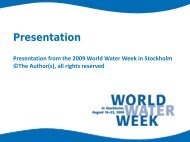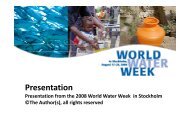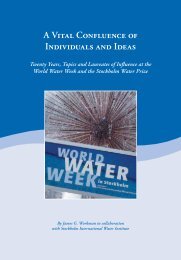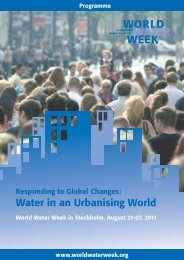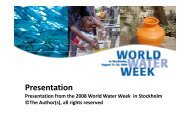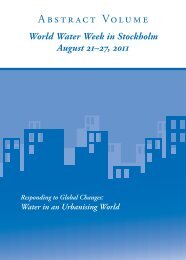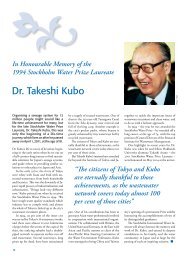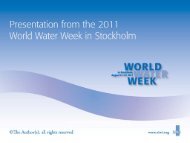Final Programme Beyond the River - World Water Week
Final Programme Beyond the River - World Water Week
Final Programme Beyond the River - World Water Week
Create successful ePaper yourself
Turn your PDF publications into a flip-book with our unique Google optimized e-Paper software.
Wednesday 23 August<br />
Workshop 5<br />
Decision Support Systems and IWRM<br />
Convenor: Stockholm International <strong>Water</strong> Institute (SIWI)<br />
Co-convenors: Global <strong>Water</strong> Partnership (GWP) and Stakeholder Forum for a Sustainable Future<br />
Workshop Discussion Entry Points<br />
There are many examples of decision support systems<br />
(DSS) around <strong>the</strong> world, but <strong>the</strong>re seems to be few which<br />
cover all relevant issues in <strong>the</strong> development and implementation<br />
of IWRM in practice. For DSS to be effective,<br />
<strong>the</strong> main obstacles as well as <strong>the</strong> successful factors must<br />
be identified and properly taken into account in its development<br />
and implementation.<br />
Governance and <strong>the</strong> role of policy, regulations,<br />
and of local institutions<br />
DSS tend to be designed from <strong>the</strong> requirements of planning<br />
and similar formal institutions. With reference to<br />
<strong>the</strong> support for IWRM, what are <strong>the</strong> requirements in<br />
terms of inter-sector linkages to enhance an integrated<br />
approach in water governance? Similarly, what kind of<br />
support is required to integrate local level issues with a<br />
composite regional, basin or national perspective?<br />
Stakeholders and societal negotiation processes<br />
It is more and more recognised within <strong>the</strong> development<br />
community as well as within <strong>the</strong> community of water pro-<br />
fessionals that increased dialogue between<br />
business, government and <strong>the</strong><br />
civil society is needed. How can true<br />
participatory dialogue and outcomes<br />
of negotiation processes among relevant<br />
parts of society be involved<br />
when elaborating a DSS?<br />
Decision support system that<br />
works in practice<br />
DSS must be designed so that <strong>the</strong><br />
users can apply <strong>the</strong>m in <strong>the</strong>ir daily<br />
duties or in strategic planning.<br />
What is <strong>the</strong> role of models, data<br />
retrieval systems and o<strong>the</strong>r similar<br />
tools? DSS should also facilitate<br />
dialogue between different interests<br />
groups and people from various<br />
backgrounds and with various<br />
technical and o<strong>the</strong>r kinds of knowledge.<br />
How can DSS be designed to<br />
contribute to such a dialogue?<br />
<strong>Programme</strong> Wednesday 23 August, 09:00–17:00 Folkets Hus, Congress Hall A<br />
Chair: Prof. Torkil Jønch-Clausen, DHI <strong>Water</strong> & Environment, Denmark<br />
Co-Chair: Mr. Felix Dodds, Stakeholder Forum for a Sustainable<br />
Future, UK<br />
Rapporteur: Mrs. Ulla-Britta Fallenius, The Swedish Environmental<br />
Protection Agency<br />
Co-Rapporteur: Mr. Alan Hall, GWP<br />
09:00 Introduction by Chair<br />
09:10 Climate Proofing of IWRM Decision Support Systems.<br />
Prof. Pavel Kabat, ALTERRA Green <strong>World</strong> Research,<br />
Wageningen University and Research Centre, Ne<strong>the</strong>rlands<br />
(Invited Speaker)<br />
09:45 Information – Analytical System of <strong>the</strong> <strong>River</strong> Basins<br />
in Kazakhstan as <strong>the</strong> Technological Basis for IWRM.<br />
Mr. Igor Shenberger, Kazgiprovodkhoz Project Institute,<br />
Kazakhstan (Invited Speaker)<br />
10:20 Coffee Break<br />
10:45 Promote IWRM to Resolve a Complex Agriculture & Fishery<br />
Issue through Dialogue – A Case from Sri Lanka. Ms. Mangala<br />
Wickramanayake, Coast Conservation Department, Sri Lanka<br />
11:00 Practical Experience towards Implementing IWRM for<br />
Sustainable Management of <strong>Water</strong> Resources in Ethiopia: <strong>the</strong><br />
Case of Two Pilot <strong>Water</strong>sheds. Mr. Kidanemariam Jembere,<br />
Ethiopia Country <strong>Water</strong> Partnership<br />
11:15 Participative Management Decision Making<br />
Guidelines for Quebec <strong>Water</strong>shed Agencies.<br />
Prof. Ca<strong>the</strong>rine Choquette, University of Sherbrooke, Canada<br />
11:30 Discussion on Presentations<br />
12:00 Lunch<br />
13:30 Introduction by Co-chair<br />
13:40 Issues Related to <strong>the</strong> Regulatory and Legal Base Development<br />
for <strong>Water</strong> Quality in Central Asia. Dr. Bulat Yessekin, The<br />
Regional Environmental Centre for Central Asia, Kazakstan<br />
13:55 The Rationale for Development of a Participatory Decision<br />
Support System for <strong>Water</strong> Resources Management in Uganda.<br />
Assoc. Prof. Gaddi Ngirane-Katashaya, Makerere University,<br />
Uganda<br />
14:10 Partnership Approaches to Decision Making: 20 years of<br />
Progress in <strong>the</strong> Mersey Basin. Mr. Mark Turner, Mersey Basin<br />
Campaign, UK<br />
14:25 A Decision Support System for an Integrated <strong>Water</strong> Resources<br />
Management in Vietnam. Prof. Harro Stolpe, Institute of<br />
Environmental Engineering and Ecology, Germany<br />
14:40 Discussion on Presentations<br />
15:00 Coffee Break<br />
15:30 <strong>Final</strong> Discussion and Conclusions<br />
38


